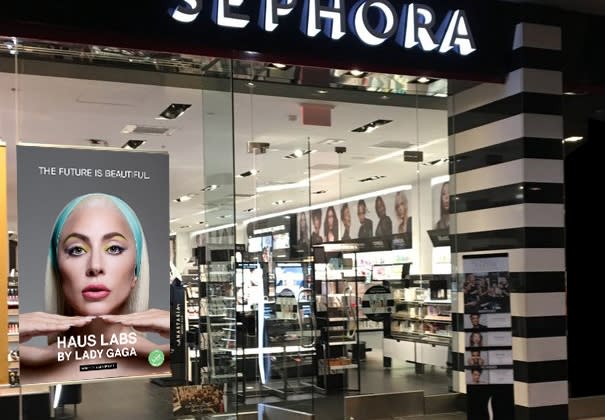Online Beauty Sales Drop 14 Percent, 1010Data Finds

The beauty industry has demonstrated resilience in the face of mounting economic uncertainty, and it appears consumers’ shift back to brick-and-mortar is a leading catalyst for the phenomenon.
A new report by 1010Data has found that while beauty sales at large remain on the rise, online beauty sales have endured a 14 percent year-over-year decrease in 2022 as consumers move away from e-commerce.
More from WWD
“Despite recent pressures including supply chain challenges, tight labor markets and rising inflation, retailers are reporting continued growth in the beauty category,” said Jonah Ellin, chief product officer at 1010Data. “While our data registers a drop in online sales, the overall positive increase in year-over-year earnings stated by retailers in their earnings reports suggests a movement back to shopping in stores, at least when it comes to this high-touch category.”
Despite recent declines, online beauty sales remain up 36.3 percent over pre-pandemic levels, per 1010Data’s findings. In its report, the data management platform compared the first-quarter 2022 earning reports of leading beauty retailers including Ulta, Macy’s Inc., Target Corp., Nordstrom Inc. and Sephora, to track where and in which sectors declines (and growth) are most prevalent.
In the prestige beauty space, 1010Data found that Macy’s share growth has picked up by 3 percent, while leading competitor Sephora has comparatively faced a 2.1 percent decline. Also of note: Target gained 1 percent, while Ulta and Nordstrom tracked 0.4 percent and 1.2 percent decreases, respectively.
Largely driving Macy’s growing share is fragrance, which has seen 6 percent growth in sales at the retailer over the last year. Additionally, body care and lip products have seen online growth at Macy’s, despite both experiencing online declines at Sephora over the same period.
At Target, eye makeup, body care and sun care products were the most significant drivers of share gain, growing by 1.7, 1.2 and 0.6 percent, respectively.
While Target and Macy’s have seen the largest share gain in e-commerce beauty sales over the last year, both beauty merchants saw declines in their share of facial care products, which decreased by a respective 3.4 and 1.8 percent.
Macy’s also saw declines in its share of face and eye makeup products, while Target saw declines in its share of face makeup, hair care and hair appliances.
Leonard A. Lauder’s so-called Lipstick Index seems to be in full effect at the two retailers, however, with Macy’s seeing a 1.2 percent gain in lip makeup share, while Target has tracked a comparative 1.5 percent increase in share for the category.
The gains endured by Target and Macy’s appear to be the exception, not the rule: remaining retailers have seen, on average, a 0.6 percent decrease in eye makeup share, and even a 0.2 percent decrease in lip makeup share, when it comes to online sales.
The convenience of delivery service seems to have taken a backseat for consumers, with Sephora and Nordstrom encountering respective 3.2 and 1.3 percent declines in delivery share, while Kohl’s Corp. and Macy’s were the only retailers to experience increases, rising by 0.2 and 4.3 percent, respectively.
Sephora did, however, soar past competitors in terms of buy online, pick up in store, or BOPIS, orders, seeing a 7.8 percent share increase while Ulta, Kohl’s, Nordstrom, Target and Macy’s all saw declines — the most significant being at Ulta, which saw a 6 percent decline in share for BOPIS orders.
While online beauty sales took off at the height of the pandemic, with 1010Data previously reporting that they were up 51 percent in 2020 versus 2019, they have begun to wane. Whether it be to more accurately shade-match their foundation, or simply alleviate the collective cabin fever much of the population has endured over the past two years, consumers are increasingly reverting to in-store shopping when it comes to making beauty purchases.
Ellin suggested beauty retailers can boost their online presence targeting key search terms that “highlight their value proposition” in order to more successfully garner the attention of consumers who are “shopping online for convenience, value, and to reward themselves following an unexpectedly long period of remote work.”
Sign up for WWD's Newsletter. For the latest news, follow us on Twitter, Facebook, and Instagram.
